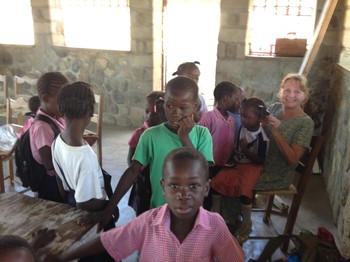Big things sometimes come from small beginnings, and this adage holds true for the partnership between a group of small South Carolina churches and their friends in Haiti.
More than 20 years ago, a group of about 15 small churches between Greenville and Columbia, S.C., decided to do ministry together. The area has a rich Presbyterian history, with the small town of Clinton playing home to Presbyterian College, Thornwell Home for Children and a Presbyterian retirement community. During the last 200 years, Presbyterian churches were also planted all across this area, known as Greater Laurens County.
“These are very small churches, some single-digit type congregations [or] worshiping congregations, and we decided that together we could probably do some things that we couldn’t pull off alone,” said the Rev. Herb Coddington, pastor of Bethany Presbyterian Church in Greenville. “Even though we do fellowship activities and training activities and that sort of thing, our primary motivation and energy is toward mission.”
Members of the group host international students and support a full-time missionary in Albania, but the biggest outreach is to Haiti. About 17 years ago, some of the cluster went to the Dominican Republic and Haiti to explore ministry opportunities.
“We got linked up with a non-denominational organization called Mission Possible,” Coddington said. “We thought that was a good fit and we started sending teams down. About 12 or 13 years ago as we consulted with our Haitian colleagues they said it would really be helpful if we could offer weeklong seminars.”
The group started with six seminars for about 70 teachers and school administrators on various topics. As the seminars grew in popularity, pastors began asking for sessions of their own.
“We started with about a half dozen pastors under a mango tree,” Coddington said, adding that at the end of 2013, “we had 650 pastors for a seminar.”
The cluster has also started a vocational school and a nursing school and is now hosting training seminars for those professions.
“It’s grown in popularity and the number of seminars has increased. The presenters come from all over.” Coddington said. “It was something that was started by the cluster of small PC(USA) congregations but it has certainly gone much bigger from that and it’s something that is anticipated every year by our Haitian colleagues.”
For the churches in the cluster, the real eye-opener of what they could achieve came after a hurricane hit Haiti 10 years ago. They knew some of the places affected and felt compelled to do something to help. After some phone calls to food wholesalers and airlines, they arranged to send in relief supplies.
“These small churches in a very brief time span, probably a couple weeks or so, sent in 15 tons of relief goods,” Coddington said. “When the small churches realized what they were doing, you could see people dreaming again and realizing by doing this together we need to behave like a larger church should.”
Children from Thornwell also got involved when they found out one of the Haitian schools was destroyed. They started by putting aside some of their allowance money and raised about $10,000. When other groups found out, they also chipped in, collecting about $26,000 to rebuild the school.
In an effort to help build the relationship between the Haitians and the South Carolina churches, a Thornwell student went on the most recent trip and spoke at several schools and the pastor seminar. It was from her that partners in Haiti began to get a true picture of the people who were helping them.
“She was homeless, living under a bridge, and for awhile under the bridge she had a mattress but the mattress was taken from her and then she has been in this children’s home for about a dozen years,” Coddington said. “Haitian people could not imagine somebody in America going through that, and so that was part of what was so compelling.”
Because megachurches are so frequently seen in the news, many Haitians think those churches are typical of American congregations. But when Haitian partners come to the small churches in South Carolina, they are surprised that churches so small can do so much.
“Together we can do things we could not do going solo,” Coddington said. “We just think that as smaller churches are hit more and more with financial necessities that thinking collaboration is a good way to go.”
Toni Montgomery is a freelance writer in Statesville, N.C., where she is also secretary for First Presbyterian Church.

